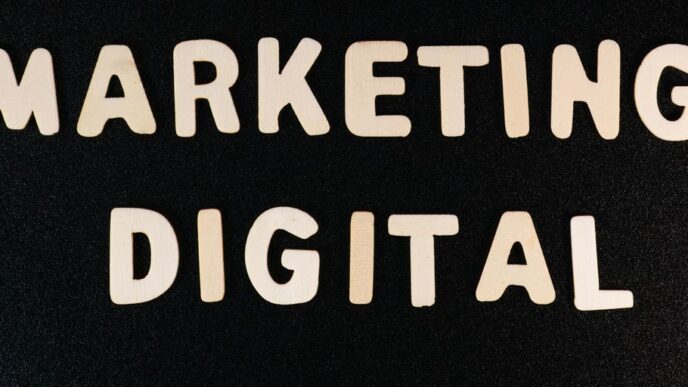Looking to amp up your business game in 2025? Digital marketing platforms are where it’s at. With so many options out there, finding the right fit can feel like searching for a needle in a haystack. But don’t worry, we’ve got you covered. This article will walk you through the top 10 digital marketing platforms that can give your business the boost it needs. Whether you’re a newbie or a seasoned pro, there’s something here for everyone. Let’s dive in and explore these platforms that are set to make waves in the digital marketing world.
Key Takeaways
- Digital marketing platforms are essential for enhancing business visibility and engagement.
- Choosing the right platform depends on your specific business needs and goals.
- HubSpot, Google Analytics, and TikTok are among the top platforms to watch in 2025.
1. HubSpot Marketing Hub
HubSpot Marketing Hub is a powerhouse when it comes to digital marketing platforms. It’s a one-stop-shop for businesses aiming to streamline their marketing efforts. Whether you’re a startup or a large enterprise, HubSpot offers scalable solutions that fit your needs. Let’s break down what makes it tick.
Key Features
- Content Creation: With HubSpot, you can manage your blog, create landing pages, and design email templates. This makes it easy to run impactful campaigns without needing a separate tool for each task.
- Marketing Automation: Automate workflows such as lead nurturing and customer onboarding. This not only saves time but also ensures consistency in your marketing efforts.
- Social Media Management: Schedule, monitor, and analyze your social media campaigns all in one place. This feature helps you maintain a strong online presence across various platforms.
- SEO Tools: Built-in SEO recommendations help you optimize your content for search engines, making it easier for potential customers to find you.
- Lead Management: Track, nurture, and convert leads with advanced tools that give you a comprehensive view of your customer journey.
- Custom Reporting: Tailor your analytics and dashboards to meet your specific needs, giving you the insights necessary to make informed decisions.
- A/B Testing: Test different variations of emails, content, or landing pages to see what works best for your audience.
Pros and Cons
Pros:
- All-in-One Platform: Combines multiple marketing tools under one roof, making it easier to manage your marketing strategy.
- Robust Integrations: Seamlessly connects with CRM, sales, and customer service tools, enhancing your workflow.
- Extensive Training Resources: Access to HubSpot Academy, where you can find tutorials and certifications to boost your skills.
Cons:
- Cost: Premium plans can be pricey, especially for small businesses.
- Learning Curve: Some features are complex and may take time to master.
- Customization Limits: Pre-designed templates might not fit very specific needs.
Pricing
HubSpot offers a free tier with essential features to get you started. For those looking for more advanced tools, the basic marketing package starts at $50 per month.
User Reviews
HubSpot Marketing has a solid reputation with users, boasting a 4.5 rating on Capterra and a 4.4 on G2. Users appreciate its easy-to-use interface and comprehensive toolset, though some mention that the customization options can be limiting.
Conclusion
Overall, HubSpot Marketing Hub is a versatile platform that caters to a wide range of marketing needs. Its ability to integrate with various tools and provide detailed analytics makes it a favorite among digital marketers. However, businesses should consider the cost and complexity before diving in. For those ready to invest, HubSpot offers a robust solution to enhance your marketing strategy.
2. Google Analytics

Google Analytics is like the Swiss Army knife for anyone running a website. It’s packed with tools that help you understand how visitors interact with your site. You can track everything from where your visitors are coming from to what they’re doing once they get there.
Key Features
- Detailed Metrics: Get a deep dive into your website’s performance with metrics on traffic, user behavior, and conversions.
- Custom Reports: Tailor your reports to focus on the data that matters most to your business.
- Integration with Other Tools: Easily connect Google Analytics with other Google services like Google Ads to streamline your marketing efforts.
How It Works
- Set Up: Install Google Analytics on your website. It’s pretty straightforward, and there are tons of guides out there to help.
- Track Visitors: Once it’s up and running, you’ll start seeing data on who visits your site, how they got there, and what they do.
- Analyze and Adjust: Use the insights you gain to tweak your website and marketing strategies.
Google Analytics is a must-have for anyone serious about understanding their online audience. Whether you’re a small business or a large corporation, this tool can help you make data-driven decisions to improve your online presence.
3. Google Ads
Google Ads is one of the most powerful tools for businesses looking to reach potential customers through paid advertising. It’s like having a giant billboard on the internet, but way more targeted and effective. Here’s why Google Ads should be on your radar if you’re serious about boosting your business in 2025.
Google Ads offers a range of campaign types to suit different marketing goals:
- Search Campaigns: These are the text ads that appear on Google’s search results page. They’re perfect for capturing users who are actively searching for products or services like yours.
- Display Campaigns: These ads appear on websites across the internet. They are great for building brand awareness and reaching people who might not be actively searching for your product but could be interested.
- Video Campaigns: Primarily run on YouTube, these ads can be skippable or non-skippable. They’re excellent for engaging users with visual content.
The beauty of Google Ads lies in its targeting capabilities. You can reach people based on their location, interests, and even their previous interactions with your website. This means your ads are shown to the right people at the right time.
Setting up a Google Ads campaign involves several steps:
- Define Your Goals: What do you want to achieve? More website visits, sales, or maybe brand awareness?
- Choose the Right Keywords: Keywords are the backbone of your search campaigns. Use tools like Google’s Keyword Planner to find the right ones.
- Create Compelling Ads: Your ads should be clear and persuasive. Highlight what makes your business stand out.
Monitoring and optimizing your campaigns is crucial. Regularly check how your ads are performing and make adjustments as needed. This might involve tweaking your keywords, changing your ad copy, or adjusting your bids.
In 2025, with the digital landscape more competitive than ever, leveraging tools like Google Ads will be essential for staying ahead. It’s not just about reaching more people; it’s about reaching the right people and turning clicks into customers.
4. Sprout Social
Sprout Social is a powerhouse when it comes to managing your social media presence. If you’re serious about staying on top of your social media game, this tool is worth checking out.
Why Use Sprout Social?
Sprout Social is like your all-in-one control center for social media. It helps you not just post content, but also understand how it performs and how people are engaging with it. Here are some reasons why you might want to consider it:
- Social Media Scheduling and Publishing: You can plan and schedule your posts across multiple platforms. This means you won’t have to worry about missing the best times to post.
- In-depth Analytics and Reporting: Sprout Social offers detailed insights into your social media metrics. You can see what’s working and what isn’t, helping you tweak your strategy.
- Social Listening and Monitoring: This feature lets you keep an ear to the ground. You can track conversations around your brand and industry, which is super helpful for engaging with your audience.
Features That Stand Out
Sprout Social isn’t just about the basics. It comes packed with features that make managing social media a breeze:
- Automated Message Prioritization: This feature helps you sort through messages so you can respond to the most important ones first.
- Crisis Notifications: Get alerts when there’s a spike in activity that might indicate a problem, so you can act fast.
- AI-Assisted Responses: This can help streamline your social media interactions, making it easier to keep up with messages.
Pros and Cons
Like any tool, Sprout Social has its ups and downs:
Pros:
- Comprehensive social media management features.
- Excellent customer support.
- Intuitive interface that’s easy to navigate.
Cons:
- It can be expensive for small businesses.
- The entry-level plan is a bit limited in features.
Sprout Social is a solid choice if you’re looking to boost your social media engagement and streamline your management processes. It’s not the cheapest option out there, but it offers a ton of value for those who can make the most of its features.
5. Mailchimp

Mailchimp is a go-to platform for businesses diving into email marketing. It’s like that trusty tool in your toolbox—reliable and easy to use. Whether you’re a small business owner just starting or a seasoned marketer, Mailchimp offers something for everyone.
Key Features
- Email Campaign Builder: With a variety of templates, creating emails that look professional is a breeze. You don’t need to be a design guru to make your emails pop.
- Audience Segmentation: This feature lets you tailor your messages to specific groups. It’s like having a conversation with each customer, making your emails feel personal.
- Marketing Automation: Set up automated emails for different triggers, like welcoming new subscribers or sending out birthday wishes. It’s like having a personal assistant for your emails.
- Basic CRM Tools: Keep track of your contacts and their interactions all in one place. It’s not just about sending emails; it’s about building relationships.
- Analytics and Reporting: Dive into the numbers with detailed reports. See what works and what doesn’t, so you can tweak your strategy.
Pros
- Free Plan: Perfect for those just getting started, offering basic features at no cost for up to 500 contacts.
- User-Friendly: Even if you’re not tech-savvy, Mailchimp’s interface is straightforward and intuitive.
- Wide Range of Integrations: Connect Mailchimp with other tools you use, making it a versatile part of your marketing strategy.
Cons
- Pricing Escalation: As your list grows, so does the cost. Keep an eye on your budget as you expand.
- Limited Automation: Compared to some competitors, the automation features might feel a bit basic.
Mailchimp is a solid choice for anyone looking to access email marketing tools without breaking the bank. It’s especially handy for small businesses and those new to the marketing game.
6. Ahrefs
Ahrefs is a powerhouse in the world of SEO tools, perfect for those looking to boost their site’s visibility and performance. It’s like having a Swiss Army knife for search engine optimization.
Key Features
- Keyword Research and Tracking: Ahrefs excels in helping you find keywords that matter. It offers insights into search volumes, keyword difficulty, and more, enabling you to craft content that hits the mark.
- Backlink Analysis and Monitoring: Backlinks are crucial for SEO, and Ahrefs provides a detailed look at your link profile. You can see who’s linking to you, assess the quality of these links, and discover new opportunities.
- Site Audit Tools: Keep your website healthy with Ahrefs’ audit tools. It checks for issues like broken links or slow pages, helping you fix them before they impact your traffic.
- Competitor Analysis: Want to know what your competitors are up to? Ahrefs lets you peek into their strategies, from the keywords they’re targeting to the content that’s driving their traffic.
- Content Explorer for Topic Ideas: Stuck for content ideas? Ahrefs’ content explorer can help you find trending topics and popular content in your niche.
Pros and Cons
Pros:
- Comprehensive SEO toolkit that covers all bases.
- Accurate and up-to-date data ensures you’re working with the best information.
- Excellent for competitor research, giving you an edge in your market.
Cons:
- Can be pricey for smaller businesses.
- There’s a learning curve for beginners, but once you get the hang of it, it’s incredibly powerful.
Ahrefs isn’t just about data; it’s about understanding your place in the digital landscape and finding ways to improve it. Whether you’re a seasoned SEO expert or just starting out, Ahrefs offers tools that can help you climb the search engine ranks.
7. Buffer
Buffer is a go-to tool for many who want to keep their social media game strong without spending all day online. It’s like having a personal assistant for your social media. You set it up, and it handles the rest.
Key Features
- Simple Post Scheduling: Buffer lets you plan your posts ahead of time. Whether you want to post once a day or several times, you can set it and forget it.
- Team Collaboration: Got a team? Buffer makes it easy to work together. Everyone can pitch in, schedule posts, and keep the content flowing.
- Analytics: Want to know how your posts are doing? Buffer’s got you covered with insights on engagement and reach.
Why Choose Buffer?
- Ease of Use: Even if you’re not tech-savvy, Buffer is straightforward. You don’t need a manual to figure it out.
- Affordable Plans: Whether you’re a freelancer or a small business, Buffer has plans that won’t break the bank.
- Great for Small Teams: If you’re running a small operation, Buffer helps keep everyone on the same page without a hassle.
Buffer’s simplicity and effectiveness make it a favorite among small businesses and freelancers. It’s all about getting your message out there without the stress. If you’re into social media management, API integration is essential for eCommerce software vendors to enhance competitiveness and improve client services, Buffer might just be the tool you need to streamline your efforts.
8. Zoho Marketing Plus
Zoho Marketing Plus is a powerhouse for businesses looking to streamline their marketing efforts across multiple channels. It’s not just about email or social media; this platform brings everything together in one neat package. Whether you’re a startup or a big corporation, Zoho has something for everyone.
Key Features of Zoho Marketing Plus
- Cross-Channel Marketing Automation: This feature allows you to manage campaigns seamlessly across different platforms, ensuring your message is consistent and reaches the right audience.
- Real-Time Analytics: Keep an eye on how your campaigns are performing with real-time data. This helps in making quick adjustments to improve engagement and conversion rates.
- CRM Integration: Easily integrate with Zoho’s CRM to align your sales and marketing efforts. This ensures that your team is on the same page and can follow up with leads effectively.
- Customizable Dashboards: Tailor the dashboard to fit your specific needs. Whether you want to focus on email performance or social media engagement, you can set it up to display the metrics that matter most to you.
Why Choose Zoho Marketing Plus?
- Affordability: Zoho stands out with its competitive pricing, making it accessible for businesses of all sizes.
- Versatility: From email to social media to CRM, Zoho covers all bases, making it a one-stop solution for digital marketing.
- User-Friendly Interface: Even if you’re not tech-savvy, Zoho’s intuitive design makes it easy to navigate and utilize all its features.
For those looking to enhance online visibility through effective marketing strategies, Zoho Marketing Plus offers a comprehensive suite of tools. With its robust features and ease of use, it’s a top choice for businesses aiming to grow their digital presence.
9. Salesforce Marketing Cloud
Salesforce Marketing Cloud is a powerhouse for businesses looking to streamline their marketing efforts. It’s like having a digital marketing Swiss Army knife, offering a suite of tools to manage customer relationships, automate marketing processes, and analyze data.
Key Features
- Journey Builder: This tool lets you map out the customer journey, ensuring each interaction is personalized and timely. Imagine being able to send a birthday discount to a customer just at the right moment.
- Email Studio: Crafting emails has never been easier. With drag-and-drop functionality, you can create visually appealing emails without needing to know a single line of code.
- Social Studio: Manage your social media presence across platforms from one place. Schedule posts, engage with your audience, and track performance metrics.
Benefits
- Personalization: Tailor your marketing messages to fit each customer’s unique preferences and behaviors. This means more relevant content and better engagement.
- Automation: Save time by automating repetitive tasks. Whether it’s sending follow-up emails or posting on social media, automation frees you up to focus on strategy.
- Analytics: Gain insights into your campaigns with robust analytics tools. Understand what’s working and what needs tweaking, so you can continuously improve.
Considerations
- Learning Curve: While powerful, Salesforce Marketing Cloud can be complex to learn. Investing time in training is crucial.
- Cost: It’s on the pricier side, so it’s important to ensure it fits within your budget.
In a nutshell, Salesforce Marketing Cloud is a comprehensive platform that can significantly boost your marketing efforts if you’re willing to invest the time and resources to learn it. It’s not just about sending emails or posting on social media; it’s about creating a cohesive, personalized experience for your customers.
10. TikTok
TikTok has become a major player in the digital marketing scene, especially for businesses looking to connect with younger audiences. It’s not just about dance challenges and viral trends; TikTok is a powerful tool for brands to showcase their creativity and engage with users in a fun way.
One of the main reasons TikTok is so effective is its algorithm, which is designed to get content in front of the right eyes. This means your videos have a higher chance of reaching people who are genuinely interested in what you’re offering. Plus, the platform’s short-form video format encourages quick, engaging content that can be digested on the go.
Key Features
- Video Creation Tools: TikTok provides a variety of tools to help you create visually appealing and engaging videos. From filters to music, the options are endless.
- Real-Time Analytics: Keep track of how your content is performing with TikTok’s built-in analytics. This feature helps you understand which types of videos resonate with your audience.
- Audience Targeting: Use TikTok’s targeting options to ensure your content reaches the right demographic. This is especially useful for businesses looking to expand their reach.
Pros and Cons
- Pros:
- Built-in video management tools make it easy to create and edit content.
- Real-time analytics allow for quick adjustments to improve performance.
- The platform is great for reaching a younger audience.
- Cons:
- Viral success can be unpredictable, making it hard to plan long-term strategies.
- Content has a short lifecycle, requiring frequent updates to stay relevant.
Integrations
TikTok integrates with several ecommerce platforms like Shopify and WooCommerce, allowing businesses to link their product catalogs directly to their TikTok profiles. This feature makes it easier for users to discover and purchase products without leaving the app.
In conclusion, TikTok is not just a social media app; it’s a dynamic marketing platform that offers a unique way to connect with audiences. Whether you’re a small business or a large corporation, TikTok provides the tools and features you need to create impactful marketing campaigns.
TikTok has taken the world by storm, becoming a favorite platform for sharing short videos. It’s a place where creativity shines, and anyone can join in on the fun. If you’re curious about the latest trends and want to learn more about how TikTok is changing the way we connect, visit our website for more insights!
Wrapping It Up
So there you have it, a rundown of the top digital marketing platforms that could give your business a real boost in 2025. Each platform has its own perks and quirks, and the best one for you really depends on what you’re aiming to achieve. Whether you’re looking to ramp up your social media game, dive into email marketing, or optimize your SEO, there’s a tool out there for you. Remember, the key is to align your choice with your business goals and budget. Take your time to explore these options, and don’t be afraid to experiment a little. After all, digital marketing is all about trying new things and seeing what sticks. Good luck, and happy marketing!












